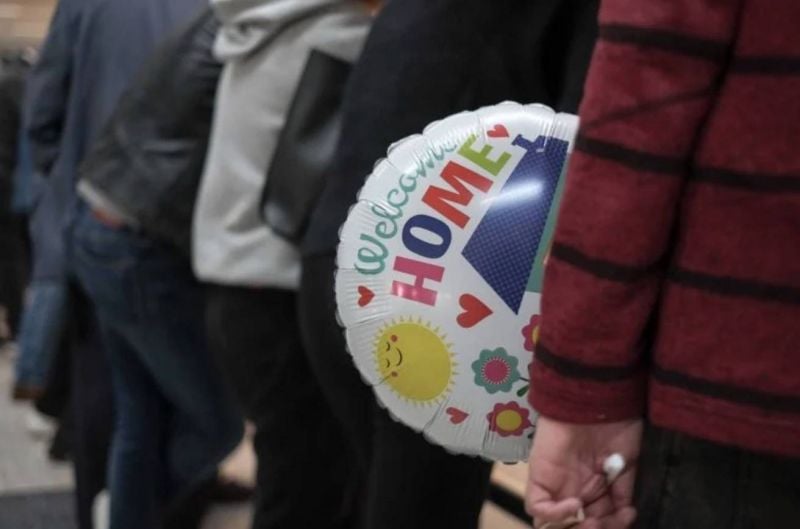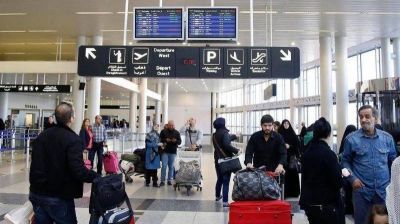
A visitor at Beirut's airport holds a welcome home ballon. (Credit: João Sousa)
Oct. 25, 2022. Emilie Edde and her husband closed the door of their Paris apartment for the last time. They left Lebanon when they were 16 and 18 respectively, in the summer of the July 2006 war.
Like many others, they studied in Paris, started their careers, got married and had a child. Although the French capital became a second home for Emilie, “the dream of a life in Lebanon” remained with her.
But Emilie knew she’d have trouble finding a job in her feild — infrastructure financing — in Lebanon. After the Beirut port explosion on Aug. 4, 2020, she put her “dream aside and wrote off Lebanon.”
Then, “ by chance,” a French company she worked with offered her a position based in Beirut. “I jumped at the chance,” she said.
Was it a crazy plan or a well-thought-out one?
“A bit of both. We based our decision to return to Lebanon on objective and subjective criteria. We weighed the pros and cons, and the pros won out,” she said.
“Many Lebanese leave with the idea of returning one day,” said Dana Naoufal, a sociologist who herself emigrated to Canada. “The idea of being able to return to Lebanon one day, as a Plan B, makes life abroad easier. The bravest take the plunge.”
What prompted Emilie to take the plunge? Especially at a time when, in the words of economist Jean Tawile, “the political and economic environment in Lebanon is very unstable?”
“Finally, we are going home,” Emilie said, “and we have the means to live in a country where the state is not available to provide the bare minimum.”
Emilie and her husband are not the only ones who chose to come back home to Lebanon amid difficult circumstances.
L’Orient-Le Jour gathered countless similar stories. They reveal a dynamic. On what scale? There are no figures for the moment, and all signs suggest it mainly concerns privileged individuals who receive their salaries in dollars.
Given that 240,000 Lebanese have decided to leave Lebanon since 2019 according to Information International’s estimates, it seems unlikely that this will change the migratory balance.
‘Sometimes I feel ridiculous to be so attached to Lebanon’
On Aug. 4, 2020, Carole lost a loved one and the decision to leave Lebanon “was made on that very day.” This mother of two believes that she was forced to move to Canada.
“Lebanon didn't want me anymore,” she said. “When I left, I didn't know if I'd ever come back.”
Carole left with her two children in May 2021. Her husband, who runs a family business, stayed in Beirut. In Montreal, distance and loneliness ate away at her. When she caught COVID-19 and had to be hospitalized, she went through “hell,” while her children were “alone and isolated in a hospital room.”
Carole realized that she would rather be “in a disastrous country,” where she is “at least surrounded” by family and friends. She returned to Beirut 16 months after leaving.
“The emigration process takes a lot of time and effort, physically, psychologically and morally. Some people can’t adapt and feel lonely and isolated, so they decide to return,” said Naoufal.
Tatiana Fayad Mouracade and her husband left in September 2021, “a year after the bomb.”. For several years, her husband Peter had been talking to her about Lebanon’s “descent into hell.” Nonetheless, both remained deeply attached to their country.
Tatiana’s husband Peter launched the Muwatin Lebnene initiative during the thawra (revolution), and she is behind Vanina, a clothing brand made in Lebanon, and the vintage store Nouvelle Vague.
After Aug. 4, Peter felt it was his duty to ensure a safe environment for his son. Tatiana was pregnant with a daughter, and hospitals had been hit hard by the financial crisis.
In August 2021, Peter landed a job offer in Dubai. The family moved there two weeks later. “We took everything with us, even our car. But I still had a return ticket to Beirut,” said Tatiana.
In Dubai, she recalls they got “depressed” and felt “detached from reality.” There was also the feeling of “betraying Lebanon.” The decision to return was taken in one night, after drawing a comparative table that tipped the scales in Lebanon’s favor.
“[Here, there is] family, nature that we love, a school system that we know.” In the middle of the school year, seven months after leaving, the whole family returned to Beirut. “Sometimes I feel ridiculous to be so attached to Lebanon,” said Tatiana. But this country has given me so much, and I’m not going to slam the door at the first opportunity.”
‘Dollarized’
Amale, who moved to Qatar with her two daughters and husband, returned to Lebanon at the start of the 2022 school year. But without her husband. He had already been living in Doha for several years and stayed there to support the family, now based in Beirut’s suburbs.
“Life for the whole family in Doha was too expensive,” she said. “The school, the supermarket, the bigger apartment; it all cost a fortune. Today, we have the luxury of being dollarized in Lebanon, so things are easier for us.”
“People have a desperate need to belong,” said Ramzi Abou Ismail, psychologist and lecturer at the University of Kent.
“With time, they forget how they felt when they wanted to leave, and simply rationalize why they left: to earn money, to get a passport, to get a better education... When they get these things, they decide to come back.”
L’Orient-Le Jour collected several similar testimonials from people who emigrated to the Gulf before returning to Lebanon fairly quickly.
“Any company that recruits Lebanese in the Gulf countries knows that demand is high, so they took advantage of the situation to hire them at rather low salaries,” said Tawile.
“These salaries were too low for them to live as they wished in the Gulf,” he said. “By living in Lebanon on fresh dollar incomes, they can maintain their quality of life,” he added.
Two schools we contacted confirmed they had admitted students this year who had previously left the country. At the Grand Lycée Franco-Libanais in Achrafieh for example, “59 students, [from] 33 families, returned this year,” says principal Xavier Ferrand, whereas "almost no students returned last year.”
At the Athénée de Beyrouth, principal Antoine Hayek said that this trend has also been noted, with four families returning to the school.
Families, but not only families. Alain left on June 14, 2020 after signing a contract for $7,000 a month to work in distribution in Algeria.
“I felt relieved, I said to myself: finally, I am out of Lebanon!” Before landing this contract, he was earning the equivalent of $700 a month in Beirut due to the lira’s depreciation.
“But little by little, I realized that I didn't have my parents or my friends in Algeria, and I didn't know the alleys of the new city by heart, as I did in Beirut.”
He returned to Lebanon in December 2021, despite his family’s objection. Soon after, he got a job with a multinational firm where he earns the equivalent of $2,000. “I’m happy,” he said. “I am in my comfort zone. I’ll never leave again, unless...”
This article was originally published in French in L'Orient-Le Jour. Translation by Joelle El Khoury.
